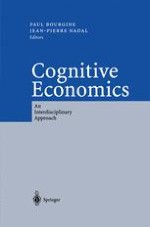2004 | OriginalPaper | Chapter
Elements of Viability Theory for the Analysis of Dynamic Economics
Author : Jean-Pierre Aubin
Published in: Cognitive Economics
Publisher: Springer Berlin Heidelberg
Included in: Professional Book Archive
Activate our intelligent search to find suitable subject content or patents.
Select sections of text to find matching patents with Artificial Intelligence. powered by
Select sections of text to find additional relevant content using AI-assisted search. powered by
The main purpose of viability theory is to explain the evolution of the state of a control system, governed by nondeterministic dynamics and subjected to viability constraints, to reveal the concealed feedbacks which allow the system to be regulated and provide selection mechanisms for implementing them.It assumes implicitly an “opportunistic” and “conservative” behavior of the system: a behavior which enables the system to keep viable solutions as long as its potential for exploration (or its lack of determinism) — described by the availability of several evolutions — makes possible its regulation.Examples of viability constraints are provided by architectures of networks imposing constraints described by connectionist tensors operating on coalitions of actors linked by the network. The question raised is how to modify a given dynamic system governing the evolution of the signals, the connectionist tensors and the coalitions in such a way that the architecture remains viable.
